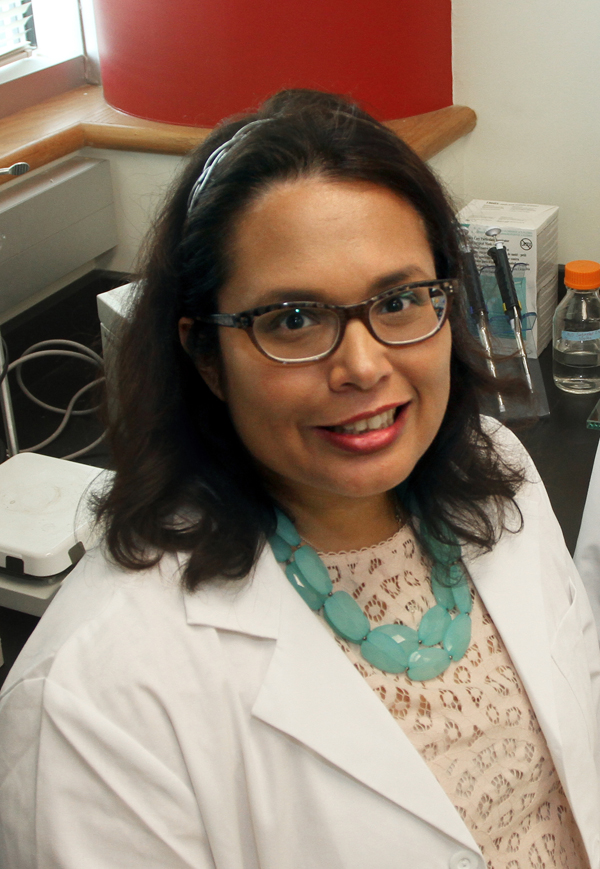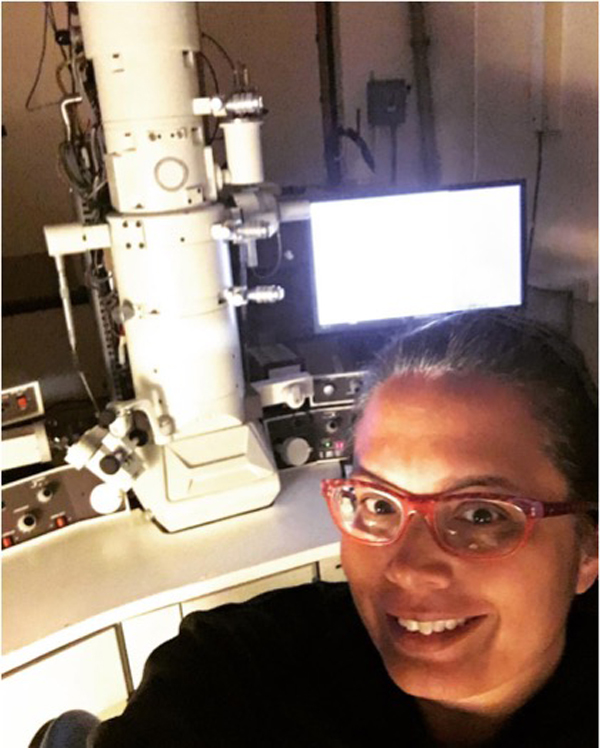Profile of a Scientific Mentor: Veronica Martinez-Acosta

While Thomas Blum, a high-school senior from Newton, Mass., was a research intern at the MBL last summer, he became interested in the experiences of women in science. For this profile, Blum interviewed Veronica Martinez-Acosta, co-director of the MBL’s Research Experiences for Undergraduates program and a biology professor at the University of the Incarnate Word in San Antonio, Texas.
Dr. Veronica Martinez-Acosta is my mentor. I’d like to briefly tell you her story.
 Veronica Martinez-Acosta, Associate Professor of Biology at the University of the Incarnate Word, San Antonio, Texas.
Veronica Martinez-Acosta, Associate Professor of Biology at the University of the Incarnate Word, San Antonio, Texas.Acosta grew up in a working class section of Houston, Texas, in a diverse community, part of a self-described Hispanic family. From a young age, she wanted to learn as much as she could, a yearning which quickly came into conflict with the norms of her culture and environment. Young girls in her neighborhood were not often encouraged to pursue interests in science, but powered by the strong will passed down from her mother, she resolved to have none of that. Instead, she learned all the science she could. Her mother built up her strength and motivation, telling her not to listen to people who “pull you down,” and instead, to “keep going.”
Her determination shone through in her love of science. In addition to her mother’s support, Acosta was fortunate to have teachers early on who recognized her talent and interest, encouraging her and giving her advice when needed. One pivotal moment was when she was chosen to participate in a summer science program for top high-school students in Houston.
“This program taught me far more than math and science. It introduced me to techniques that were not possible in my home high school, simply because the school did not have the funds to purchase the equipment. As my eyes were opened to the many scientific possibilities that awaited me, they were also opened to the great disparities present in education between the ‘haves’ and the ‘have nots’,” Acosta says.
Through this experience, she developed a strong passion to right educational inequality, a passion that still drives her today.
In college, Acosta combined her two passions, double-majoring in education and biology. Acosta considered graduate school but had no guidance for moving forward.
“Without a model to follow for applying to graduate school in the sciences, I took a job as an elementary science teacher,” Acosta says. She also volunteered after school in the lab of Dr. George Wellington, where she helped prepare coral samples for analysis of the effects of El Nino and La Nina. “From the time Dr. Wellington placed the key to the lab in my hand, I knew I was headed down the right path,” she says.
With the advice and encouragement of two undergraduate mentors, Acosta applied to graduate programs in biology, carefully following their advice to seek out the best mentors she could. She found what she was looking for at Texas A&M University (College Station), when her interviewer and future mentor, Dr. Mark Zoran, treated her as equal to the two men with whom she was interviewing.
 Martinez-Acosta works with a transmission electron microscope during a sabbatical at the MBL in 2016.
Martinez-Acosta works with a transmission electron microscope during a sabbatical at the MBL in 2016.“I learned a lot during my time in Mark’s lab, both professionally and scientifically,” she says. “I realized I could marry the two things I loved most: understanding how the brain learns and changes with experience, and study of the basic biology of an aquatic organism,.” Zoran’s lab studies neural plasticity in regenerating invertebrate neural networks.
Despite her success, Acosta still faced challenges at Texas A&M. While there were quite a few female graduate students, at the time the department was lacking in female faculty role models. Even more troubling, she found that many undergraduates for whom she was a teaching assistant treated her with far too little respect. A few trusted mentors helped her to handle the situations she was experiencing with undergraduates.
“It’s not just finding the right mentor to talk to; it is also about listening and observing how they navigate the profession,” she says. In the end, Acosta became the first person in her family to earn a Ph.D.
Mentors catalyze a sense of direction in the rising individual. We can learn on our own, but the way we truly grow is through guidance. Veronica Acosta learned the value of a strong will, fiery determination, and self-advocacy from her mentors. They enable her to stand up for herself when her voice isn’t heard. They enable her to calmly and confidently advise young women facing the same challenges. Steven Zottoli, a mentor to Acosta and an MBL Whitman Center scientist from Williams College, encouraged her to keep going towards her PhD when she faced setbacks.
Acosta experienced first-hand the difficulties involved in succeeding in academia, but more specifically, the challenges faced by Hispanic females in academia. The mentors of the scientific world bear a responsibility to fight back against such inequality.
“For this reason, I am passionate in my role as a mentor; to help bridge the gap between failure and success regardless of the challenges faced,” she says. “Through the work of mentors, the tides will begin to shift and the challenges faced by many underrepresented groups will no longer take away their ability to rise through the ranks of academia.”